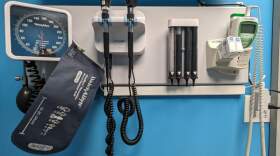Karen Brown
Reporter/Producer/HostKaren is a radio and print journalist who focuses on health care, mental health, children’s issues, and other topics about the human condition. She has been a full-time radio reporter for NEPM since 1998. Her features and documentaries have won a number of national awards, including the National Edward R. Murrow Award, Public Radio News Directors, Inc. (PRNDI) Award, Third Coast Audio Festival Award, and the Daniel Schorr Journalism Prize.
Karen’s work has appeared on NPR, in The New York Times, and other outlets. She previously worked as a reporter for The Philadelphia Inquirer. She earned a Masters of Journalism from the University of California at Berkeley in 1996.
She can be reached at karen_brown [at] nepm.org.
-
Massachusetts legislators have until mid-March to vote on measures that would legalize online roulette, blackjack, and other casino-style games. Opponents say that form of gambling is highly addictive.
-
A new website, Valleyvax.org, aims to build trust among parents who may be confused by the change in the CDC's vaccine guidelines. The local website recommends the previous, science-based vaccine schedule, which is supported by national health organizations.
-
Five years ago, a predominantly Black church in Springfield, Massachusetts, named after Martin Luther King Jr., was burned down in a suspected hate crime. Church leaders say they are trying to focus not on the fire but on rebirth and forgiveness.
-
About 1500 people turned out in downtown Northampton in response to the killing of Renee Good in Minneapolis by an ICE agent. It was one of dozens of protests around New England.
-
According to new research from Harvard Medical School, the number of primary care providers leaving traditional practice and using a membership model has gone up by about 80 percent since 2018.
-
Valley Medical Group says it’s entering a partnership with a Cambridge-based company to negotiate better insurance contracts and eventually offer better care. They hope to avoid becoming part of a large hospital system, as many primary care practices have done.
-
As people with SNAP food benefits brace for stricter rules and eligibility, retired teacher Mary Cowhey of Northampton, Mass., can attest to the longterm consequences of not having enough to eat.
-
The traveling program, created by Naomi Westwater, aims to give credit to the role of musicians of color in the folk music genre while supporting today's non-white folk artists.
-
In 1907, a wealthy Massachusetts astronomer managed to convince much of the country there was proof of life on Mars. Science writer David Baron's book, "The Martians," traces the rise and fall of that theory, including the role of an Amherst college scientist and his writer wife.
-
Campbell, in her first term in office, attended a fundraiser for her re-election campaign in Northampton, Mass., recently. She currently has no challengers from either party.










